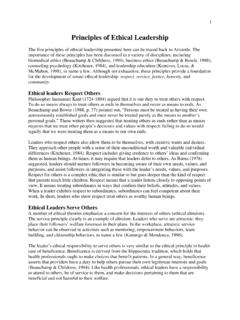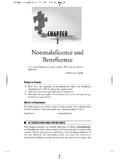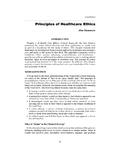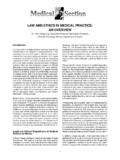Search results with tag "Beneficence"
Occupational Therapy Code of Ethics (2015)
www.pacificu.eduBENEFICENCE Principle 1. Occupational therapy personnel shall demonstrate a concern for the well-being and safety of the recipients of their services. Beneficence includes all forms of action intended to benefit other persons. The term beneficence connotes acts of mercy, kindness, and charity (Beauchamp & Childress, 2013).
AOTA 2020 Occupational Therapy Code of Ethics
www.ncbot.orgPrinciple 1. Beneficence Occupational therapy personnel shall demonstrate a concern for the well-being and safety of persons. The Principle of Beneficence includes all forms of action intended to benefit other persons. The term beneficence has historically indicated acts of mercy, kindness, and charity (Beauchamp & Childress, 2019).
Principles — Respect, Justice, Nonmaleficence, Beneficence
www.nwabr.orgPrinciples — Respect, Justice, Nonmaleficence, Beneficence Adapted with permission from Laura Bishop, Ph.D., Kennedy Institute of Ethics, Georgetown University ... is “First, do no harm.” Beneficence (do good) Provide benefits to persons and contribute to their …
Principles of Ethical Leadership - Southeastern Homepages
homepages.se.educare of beneficence. Beneficence is derived from the Hippocratic tradition, which holds that health professionals ought to make choices that benefit patients. In a general way, beneficence asserts that providers have a duty to help others pursue their own legitimate interests and goals (Beauchamp & Childress, 1994).
Nonmaleficence and Beneficence - Jones & Bartlett Learning
samples.jbpub.compatients’ rights, and provide treatment for people who need it. Kantians agree that these obligations exist because you are dealing with the basic needs of humanity and because all people have value. However, in day-to-day healthcare decisions, the utilitarian view of beneficence is often used.
Nonmaleficence and Beneficence - Jones & Bartlett Learning
samples.jbpub.comINTRODUCTION AND DEFINITIONS This chapter presents two parallel principles of ethics: nonmaleficence and beneficence. Some ethics writers view these principles as inseparable cousins. Others argue that nonmaleficence is the strongest obligation of the two. Whatever the relationship, these two areas are central to a
CODE OF PROFESSIONAL ETHICS FOR ... - rehabworks.org
www.rehabworks.orgThe fundamental spirit of caring and respect with which the Code is written is based upon six principles of ethical behavior: Autonomy: To respect the rights of clients to be self-governing within their social and cultural framework. Beneficence: To do good to others; to promote the well-being of clients.
Principles of Ethics - ONS
www.ons.orgtion (Beauchamp & Childress, 2012). They proposed four key principles: respect for autonomy, beneficence (the obligation to do good), nonmaleficence (the duty not to harm), and justice. Others in bioethics have suggested additional derivative principles, including veracity (the obligation to tell the truth), fidelity (the duty
Code of Ethics - Canadian Counselling and Psychotherapy ...
www.ccpa-accp.cafollowing fundamental principles: a) Beneficence - Being proactive in promoting the best interests of clients. b) Fidelity - Honouring commitments to clients and maintaining integrity in counselling relationships. c) Nonmaleficence - Refraining from actions that risk harm and not willfully harming clients.
Ethics in Clinical Psychology
www.apa.orgGeneral Principles Principle A: Beneficence and Nonmaleficence ... Psychologists recognize that fairness and justice entitle all ... and to equal quality in the processes, procedures, and services being conducted by psychologists. Principle E: Respect for People's Rights and Dignity Psychologists respect the dignity and worth of all people, and ...
Research Methods, Design, and Analysis - Pearson
www.pearsonhighered.comBeneficence and Nonmaleficence | 100 Fidelity and Responsibility | 102 Integrity | 102 Justice | 103 Respect for People’s Rights and Dignity | 103 APA Ethical Standards for Research | 104 Ethical Issues to Consider When Conducting Research | 104 …
Contemporary Ethical Decision-manuascript - ed
files.eric.ed.govpractice in the mental health field and the common foundational principles on which those ethics are based (viz., autonomy, beneficence, nonmaleficence, justice, fidelity, and veracity); • the community standards or mores of the culture in which one practices as well as the standard of practice in the mental health profession;
Ethical Challenges in Medical Decision Making
www.nchcnh.org3/16/2012 1 Ethical Challenges in Medical Decision Making Phil Lawson MD, ABHPM Mud Conference 2012 Objectives 1. Define autonomy, beneficence, non maleficence, and justice
HealthStream Regulatory Script
www.healthstream.com2004 Four Basic Principles The four basic concepts of medical ethics are: • Beneficence • Non-maleficence • Respect for patient autonomy • Justice Click on each to learn more.
Principles of Healthcare Ethics
samples.jbpub.comfoundation by showing how those theories inform the principles used in health care and apply to the issues in that field. The principles commonly used in healthcare ethics—justice, autonomy, nonmaleficence, and beneficence— provide you with an additional foundation and tools to use in making ethical decisions.
LAW AND ETHICS IN MEDICAL PRACTICE: AN OVERVIEW
www.fmshk.orgfundamental principles that apply generally to medicine or health care at large are: (a) respect of patient's autonomy; (b) the principle of nonmaleficence, i.e., the duty to avoid harm or injury to patients; (c) the principle of beneficence, i.e., the duty to do good to your patients, relieve their pain and suffering and to save life if you can;
Similar queries
Beneficence, Principles — Respect, Justice, Nonmaleficence, Beneficence, First, do no harm, Principles of Ethical Leadership, Of beneficence, Nonmaleficence and beneficence, People, Dealing, Healthcare, DEFINITIONS, Principles, Respect, Principles of Ethics, Nonmaleficence, Justice, Ethical Challenges in Medical Decision Making, Autonomy, HealthStream Regulatory Script, AND ETHICS IN MEDICAL PRACTICE: AN OVERVIEW














